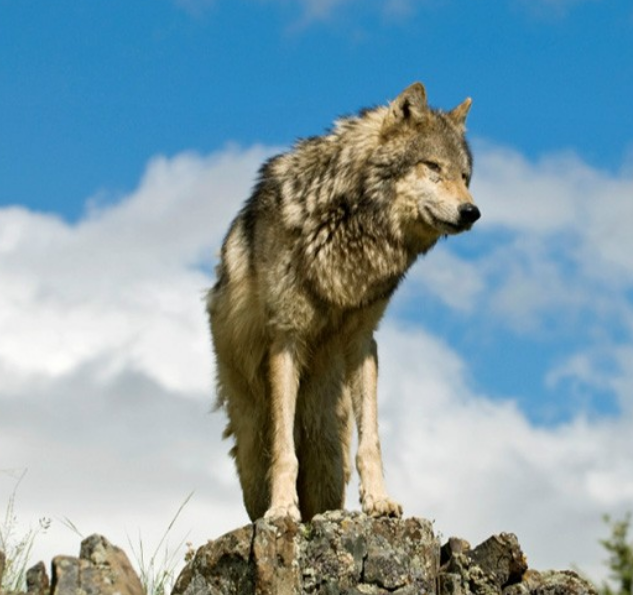
- Details
- By Native News Online Staff
A federal district court judge in Oakland, Calif. struck down a 2020 Trump administration decision that removed federal protections from gray wolves across the majority of the country.
Thursday’s 26-page ruling by U.S. District Judge Jeffrey S. White throws out the Trump administration delisting rule and reinstates federal protections for wolves in 44 states.
Want more Native News? Get the free daily newsletter today.
The Trump administration’s U.S. Fish and Wildlife Service delisted the gray wolf after 45 years of protection under the Endangered Species Act. During the 2020 presidential campaign, candidate Joe Biden expressed concern for the gray wolves; however, the Biden administration chose to defend the delisting decision.
On September 14, 2021, more than 200 tribal leaders representing tribes and advocacy organizations sent a letter to U.S Department of the Interior Secretary Deb Haaland (Laguna Pueblo) demanding emergency relisting of gray wolves.
Currently, the gray wolf is functionally extinct in more than 80 percent of its historic range, with only 6,000 surviving in the United States. Wolves figure prominently in the folklore of nearly every Native American tribe. In most Native cultures, the wolf is considered a sacred medicine being associated with courage, strength, loyalty, and success at hunting, according to the letter.
Judge White's decision was greeted with praise among Native Americans.
"American Indians are hunters but m ae-en-gun (gray wolf) is our oldest companion in our Anishinaabe Biimaadziwin (our original ways). We do not hunt wolves because we don’t eat wolves. In Michigan, via referenda, I was among the Michigan citizens who stopped two efforts of the legislature to establish a wolf hunt. I appreciate the broad coalition of tribal people, non-native activists and the National Humane Society to win these fights," Sault Ste. Marie Tribe Chairperson Aaron Payment said to Native News Online.
“Wolves need federal protection, period,” said Kristen Boyles, attorney at Earthjustice. “The Fish and Wildlife Service should be ashamed of defending the gray wolf delisting, and it should take immediate action to restore Endangered Species Act protections to all gray wolves, including those in Idaho, Wyoming, and Montana.”
Earthjustice challenged the wolf delisting in a lawsuit on behalf of Defenders of Wildlife, Center for Biological Diversity, Sierra Club, National Parks Conservation Association, Oregon Wild, and the Humane Society of the United States in January of 2021; that lawsuit was joined by another coalition of conservation groups and the Natural Resources Defense Council.
After the gray wolf was removed from the protections of the Endangered Species Act, Wisconsin held a tragic wolf hunt, where hunters with dogs slaughtered 218 wolves in three days — exceeding the harvest quota by nearly 100 animals. In Idaho and Montana, where wolves were stripped of federal protections a decade ago, the states have allowed increased wolf slaughter.
On Tuesday, Sec. Haaland published an essay in USA Today that expressed dismay about threats to wolves. She said that she was alarmed by reports from Montana, where nearly 20 wolves have been killed this season after leaving the boundaries of Yellowstone National Park. According to Sec. Haaland the Fish and Wildlife Service, which is with the Dept. of the Interior, is evaluating whether it would be necessary to relist wolves in the Northern Rockies.
More Stories Like This
Native News Weekly (August 25, 2024): D.C. BriefsUS Presidents in Their Own Words Concerning American Indians
Indigenous Actor Elaine Miles Reports Detention by Alleged ICE Agents
Happy Thanksgiving from Native News Online
Coming Up on Native Bidaské: Behind the Animation: Joey Clift Talks “Pow” and Native Storytelling
Help us tell the stories that could save Native languages and food traditions
At a critical moment for Indian Country, Native News Online is embarking on our most ambitious reporting project yet: "Cultivating Culture," a three-year investigation into two forces shaping Native community survival—food sovereignty and language revitalization.
The devastating impact of COVID-19 accelerated the loss of Native elders and with them, irreplaceable cultural knowledge. Yet across tribal communities, innovative leaders are fighting back, reclaiming traditional food systems and breathing new life into Native languages. These aren't just cultural preservation efforts—they're powerful pathways to community health, healing, and resilience.
Our dedicated reporting team will spend three years documenting these stories through on-the-ground reporting in 18 tribal communities, producing over 200 in-depth stories, 18 podcast episodes, and multimedia content that amplifies Indigenous voices. We'll show policymakers, funders, and allies how cultural restoration directly impacts physical and mental wellness while celebrating successful models of sovereignty and self-determination.
This isn't corporate media parachuting into Indian Country for a quick story. This is sustained, relationship-based journalism by Native reporters who understand these communities. It's "Warrior Journalism"—fearless reporting that serves the 5.5 million readers who depend on us for news that mainstream media often ignores.
We need your help right now. While we've secured partial funding, we're still $450,000 short of our three-year budget. Our immediate goal is $25,000 this month to keep this critical work moving forward—funding reporter salaries, travel to remote communities, photography, and the deep reporting these stories deserve.
Every dollar directly supports Indigenous journalists telling Indigenous stories. Whether it's $5 or $50, your contribution ensures these vital narratives of resilience, innovation, and hope don't disappear into silence.
 The stakes couldn't be higher. Native languages are being lost at an alarming rate. Food insecurity plagues many tribal communities. But solutions are emerging, and these stories need to be told.
The stakes couldn't be higher. Native languages are being lost at an alarming rate. Food insecurity plagues many tribal communities. But solutions are emerging, and these stories need to be told.
Support independent Native journalism. Fund the stories that matter.
Levi Rickert (Potawatomi), Editor & Publisher

